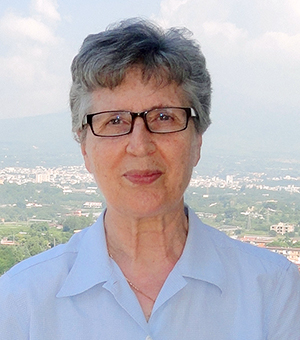THECLA. She left us on 5 February 1964, and every year we commemorate her departure for heaven on that day in a special way. She traveled a lot over the years, from one city to another, from one continent to another. She visited our communities to support their various apostolic initiatives, which was not always easy.
Memoirs of those years reveal a person totally devoted to encouraging, collaborating with and promoting evangelization projects to spread the Good News of the Gospel. Her life was filled with events that she faced with great simplicity, paired with rare wisdom and insight, unshakable faith and unwavering courage throughout the long years of her mission.
Thecla had a delicate and difficult role to carry out at the side of a man of great talent, creativity and prophetic power, whose gaze was always focused on new horizons. She observed events attentively, glimpsing possible lights for the path she had embarked on in vigilant and intelligent collaboration with Fr. James Alberione, now Blessed, who would be the Founder of the Pauline Family. At the outset, this great family was yet to be realized, but nevertheless Alberione’s goal was clear: to form men and women apostles who would use the new means of communication to spread the Gospel message.
His first meeting with Teresa Merlo took place on 27 June 1915. The 30-year-old priest was slight in stature, with an unassuming demeanor, but he was already a spiritual giant, his keen gaze fixed on future possibilities. He envisioned for the young woman standing before him a life of religious consecration in a new apostolate that would offer an important role to women in the field of evangelization. Teresa, who was twenty-one years old at the time, accepted his suggestion without hesitation, although she did not have a clear idea of just what her yes would involve.
It was the meeting of two individuals from very different backgrounds, both unaware of the great plan God was weaving for them in those years. What the priest proposed was definitely interesting to a girl living in the early 1900s, who had no future prospects as a woman either in society or in the Church. And if Alberione’s project turned out to be just a utopia? Sometimes utopias find the right place and time in which to be realized.
And so it was for the future Congregation of the Daughters of St. Paul, which would not focus on kindergarten, school, hospital or hospitality apostolates. Its mission would be directed to people’s minds, their thinking. Its purpose was to offer the message of the Gospel to society through periodicals, books and the new inventions of technology. In the beginning, Fr. Alberione called it “the apostolate of the Good Press.” Today this apostolate is not restricted to the printed word, but has expanded to include the Internet, social networks, etc.–all useful tools for the proclamation of the Gospel, in line with the Vatican Council II decree Inter Mirifica.
In a certain way, Thecla Merlo was the “mother” of the whole Pauline Family, recognized as such even by the other alberionian foundations that were gradually taking shape. She was a point of reference for the Founder, who often sought her advice. Afterward, he might still do things his own way, but he nevertheless listened carefully to her input. Even more often, he would redirect to her people and situations with problems that needed resolving, undoubtedly relying on her tried and true wisdom. In addition, her role as a “mediator” helped to smooth many of the rough paths he pursued, especially when it came to making difficult decisions. The “Pauline adventure” was just beginning and things were not always clear; sometimes they just had to be accepted with trust, even when his followers did not understand the “why” behind his choices.
It can be safely said that Sr. Thecla Merlo, alongside Fr. Alberione, was the counter melody of a complex score of faith and courage for his great apostolic initiative. Her discreet and astute presence accompanied generations of young people in the religious life. Her reassuring smile encouraged everyone. “Even if one cannot always be joyful, one can always be at peace,” she would often say. We are sure that peace was the Divine Master’s gift to her in her conversations with him at the foot of the tabernacle. It is a peace in which she is now fully immersed in the luminous mystery of God.
Beatrice Immediata, fsp
